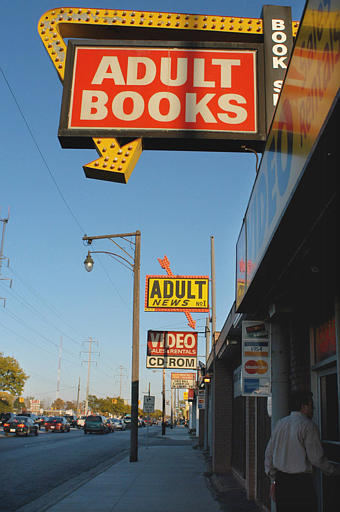In Arcara v. Cloud Books, Inc., 478 U.S. 697 (1986), the Supreme Court upheld the application of a New York public health law to close an adult bookstore on the premises of which illegal sexual activity was taking place.
Adult bookstore closed for illegal sexual activity
The bookstore had contended that this closure constituted an illegal prior restraint in violation of the First Amendment. In its decision, the Court reversed a portion of a New York court of appeals decision, which had voided the closure of the book store on the ground that the state had not used the least restrictive means to accomplish its goal.
Court upheld closure against First Amendment challenge
Chief Justice Warren E. Burger wrote the Court’s majority opinion.
Quoting from United States v. O’Brien (1968), which involved the burning of draft cards, Burger observed that when speech and nonspeech elements are combined, a regulation can be justified “if it is within the constitutional power of the Government; if it furthers an important or substantial governmental interest; if the governmental interest is unrelated to the suppression of free expression; and if the incidental restriction on alleged First Amendment freedoms is no greater than is essential to the furtherance of that interest.”
Unlike in O’Brien, however, “the sexual activity carried on in this case manifests absolutely no element of protected expression.” Concerning the bookstore case, Burger observed, “The legislation providing the closure sanction was directed at unlawful conduct having nothing to do with books or other expressive activity. Bookselling in an establishment used for prostitution does not confer First Amendment coverage to defeat a valid statute aimed at penalizing and terminating illegal uses of premises.”
In a brief concurring opinion, Justice Sandra Day O’Connor, joined by Justice John Paul Stevens, indicated that she would give greater scrutiny to such legislation if she thought the state was using it “as a pretext for closing down a bookstore because it sold indecent books or because of the perceived secondary effects of having a purveyor of such books in the neighborhood.”
Dissenters looked at role bookstores play in First Amendment free expression
Justice Harry A. Blackmun authored a dissent joined by William J. Brennan Jr. and Thurgood Marshall. Blackmun pointed to “the obvious role that commercial bookstores play in facilitating free expression.” He thought a one-year closure was too drastic and that the state should seek less drastic remedies.
John Vile is professor of political science and dean of the Honors College at Middle Tennessee State University. He is co-editor of the Encyclopedia of the First Amendment. This article was originally published in 2009.

